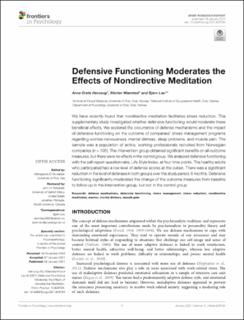| dc.description.abstract | We have recently found that nondirective meditation facilitates stress reduction. This supplementary study investigated whether defensive functioning would moderate these beneficial effects. We explored the occurrence of defense mechanisms and the impact of defensive functioning on the outcome of companies’ stress management programs regarding worries nervousness, mental distress, sleep problems, and muscle pain. The sample was a population of active, working professionals recruited from Norwegian companies (n = 105). The intervention group obtained significant benefits on all outcome measures, but there were no effects in the control group. We analyzed defensive functioning with the self-report questionnaire, Life Style Index, at four time points. The healthy adults who participated had a low level of defense scores at the outset. There was a significant reduction in the level of defenses in both groups over the study period, 6 months. Defensive functioning significantly moderated the change of the outcome measures from baseline to follow-up in the intervention group, but not in the control group. | |
